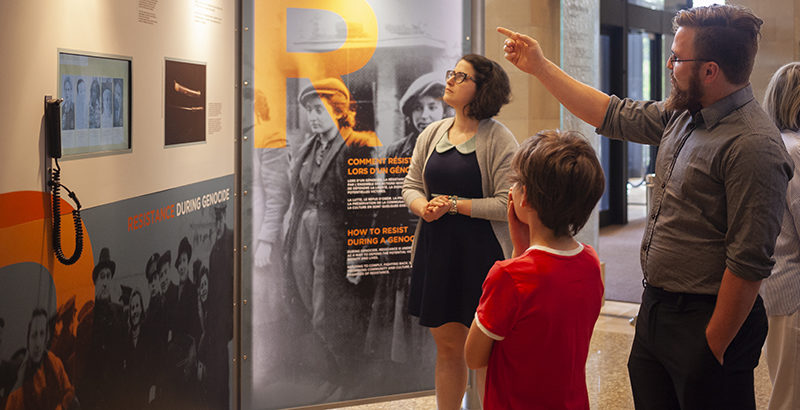A delayed plan to build a new Holocaust museum downtown is closer to realization with the purchase of land for the multimillion-dollar project.
The Montreal Holocaust Museum (MHM), which since its founding in 1979 has been in the Federation CJA building, has bought a former parking lot at 3535 St. Laurent Blvd., just north of Sherbrooke Street, covering 20,000 square feet.
President Richard Schnurbach describes it as an ideal location, situated in the heart of what was the Jewish immigrant neighbourhood and close to the Quartier des Spectacles, the city’s arts and entertainment hub.
In 2018, the MHM made known that it intended to relocate the museum from the federation building, which is in the west-end Côte des Neiges district, to a more central site where it could reach a wider audience.
A much larger, purpose-built facility was needed to accommodate an increasing number of visitors to its exhibitions and public programming, growing collection of artifacts, expanding educational activities, and greater human rights advocacy, the MHM’s leaders said.
Lead donor, the Azrieli Foundation, pledged to underwrite a third of the costs, at that time estimated at $45-$50 million.
Just before the pandemic was declared in March 2020, the MHM was close to finalizing the acquisition of another site, but that fell through.
Besides being near the Quartier des Spectacles, Schnurbach said, this site is close to universities and other museums and is easily accessible by public transit. “It gives us the presence and visibility we have long dreamed of,” he said. A chartered accountant, Schnurbach is the first grandchild of a Holocaust survivor to be MHM president.
The projected cost of the new museum is $80 million. To date, $31 million in private donations is confirmed and another $20 million is being sought from private and public sources through a campaign chaired by Julia Reitman.
The Quebec government has committed $20 million.
Plans call for the construction of a 45,000-square-foot facility that is LEED-certified and respectful of Montreal’s architectural heritage.
The permanent exhibition gallery will cover 10,000 square feet, far more than that available in the current location off the Federation building lobby. Another 3,500 square feet is earmarked for temporary exhibitions.
The museum will also house a 150-seat auditorium, an educational wing with classrooms adapted to the latest technology, commemorative space, and a café and boutique. An outdoor peace garden is envisaged.
The museum committee is headed by Jennifer Carter, a Université du Québec à Montréal museology professor.
The MHM anticipates 70,000 annual visits to the new facility. The MHM aims to be the leading organization for Holocaust education and remembrance in Canada with the possibilities opened up by its new home.
At the recent annual general meeting, executive director Daniel Amar reported that the MHM quickly pivoted at the start of the pandemic to operating virtually, having had to shut down twice for months at a time and comply with capacity restrictions when it reopened.
Between April 1, 2020 and March 31 of this year, the MHM reached 18,000 people through online public programming, including the Yom Hashoah commemoration. More than 45,000 visits to its virtual exhibitions were recorded and its YouTube videos were viewed over 263,000 times.
In-person visits numbered 1,456, of whom 494 were by students. Educational programming, geared to both students and teachers, carried on with 3,669 taking part in virtual workshops and other activities, including schools from as far away as Rimouski, Saguenay, and Gaspé.
The MHM’s Facebook and Twitter accounts now have over 5,000 followers each. Its website had 165,500 visits, up 43 percent from the previous year, and there were 402 downloads of its app.
The MHM possesses 13,505 objects related to Jewish life before, during and after the Holocaust, donated mainly by local survivors and their families. It has videotaped 858 survivor testimonies.
